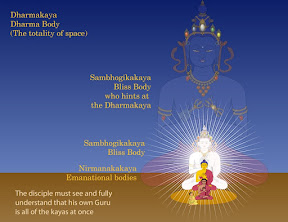
Today I was doing some reading on Indian philosophy, and in particular on the ideas of the Buddhist philosopher Nagarjuna who argued powerfully that the ultimate source of the empirical world is "emptiness" which cannot be fully identified with, nor fully distinct from, the chain of causality (or dependent origination) which upholds the empirical world. For Nagarjuna this emptiness cannot be identified with either existence or non-existence, because both of these states of (non)being are contingent on a whole host of other causes. And emptiness as such is ontologically distinct from the entire contingent world of dependent origination, and hence the ultimate emptiness which grounds the world cannot be said to exist or not exist in any meaningful sense. Thus it is erroneous to think of ultimate reality as a "being" that (a) exists, or (b) doesn't exist, or (c) exists and doesn't exist, or as (d) neither existing or not existing. In short, no categories apply meaningfully to describe the ultimate reality that grounds the world, and thus this reality is purely "empty".

















